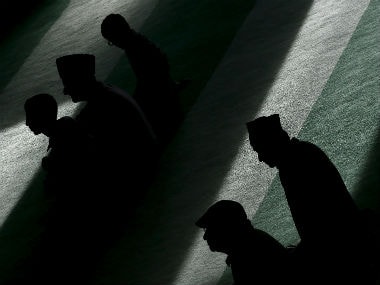In the first week of June 2018, a report appeared in Mumbai's Urdu newspapers before the third week of Ramadan ended. It was said that the special itikaf, done during the last ashra(ten days) of Ramadan, will start a day later.
Actually, this issue was of the moon or the Hijri date. Since Islamic Hijri era is calculated according to the lunar cycles, this year's Ramzan was also going on at different times across India, because the moon had not been visible in some parts of the country. Thus, roja was observed wherever the moon was visible. After a few days, Eid al-Fitr will be celebrated and there is a good chance that this problem with the moon will persist. Many times, Eid was celebrated on one day in one part of the country and on another day in another part.

Representational image. Reuters
In the 21st century, shouldn't a single date on which Muslims celebrate Eid in a big country like India be an issue worth thinking about? Apart from an effort to show Muslim unity, Eid being celebrated on a single date would have sent the practical message of unity. And everyone would be able to have a holiday on the same day. Different Muslim religious groups, organisations and institutions such as Muslim Personal Law Board should take initiative in this direction. Keeping in mind some religious rules, the moon's visible day can be determined on the basis of astronomical calculations.
Right now, it is a necessary practice to see the moon to celebrate Eid. It is only after viewing of the moon that the Islamic months begin and end, like the months of Ramzan and Shawwal. Eid al-Fitr is celebrated on the first date of Shawwal. Thus, after Eid al-Fitr moon is seen, the month of Shawwal begins. It is this moon which also marks the end of the month of Ramzan.
Many religious scholars say that in the Quran, there are no clear instructions about determining the month by looking at the moon, but it refers to the arrival of the month. Despite this, if anyone finds out through any source that Ramzan has arrived, he or she should keep fast.
Therefore, it is not necessary to view the moon in a way that has become traditional in our country to decide on Ramzan or Eid. Similarly, the Hadith (statements and deeds of Hazrat Muhammad Sallam) also speaks of 'knowledge'.
At present, there is an overwhelming majority of Muslims of Hanifi, Maliki, Hambli and Shafai ideologies. Now, whether they are living in America, Canada, Australia, UK, Europe, West Asia or elsewhere, they all depend on Saudi Arabia for the moon sighting. Therefore, Ramzan begins with the announcement of Ramzan from Saudi Arabia, and even if Eid is announced there, others also celebrate Eid.
On the contrary, the religious scholars of the South Asian countries still cling to seeing the moon by referring to the change in horizon. Keeping an archaic view alive, they continue issuing instructions to celebrate Eid on the sighting of the new moon. Although this year, the situation has changed and many Muslims in many parts of the country did not see the moon themselves but had accepted Ramzan on the basis of information received from the media.
The point of the matter is that while not negating the tradition of seeing the moon in the new month, there should also be arrangements made — on the basis of mathematical calculations and astronomy — to decide on the moon.
The issue connected with this is that of the means of setting the roja, the prayer of Magrib (at sunset) and the time of Sahri. These three practices are fully connected with sunrise and sunset. Their calculations can also be determined on a scientific basis. It should be remembered that before the arrival of Hazrat Muhammad, the calendar of Jews was prevalent in 'Tour-Gothiyyat' (age of agony). This was also a moon-based calendar. But an extra month was added to this calendar so that Haj or other festivals would fall during a specified time instead of falling in summer or winter. Later, Hazrat Muhammad made the moon-based calendar, from which all the festivals came into being in the natural order of every season.
(The author is a Visiting Fellow at Observer Research Foundation and author of the book 'Ballot: Ten Episodes That Prepared India's Democracy'.)
Updated Date: Jun 10, 2018 22:29 PM




0 Post a Comment: